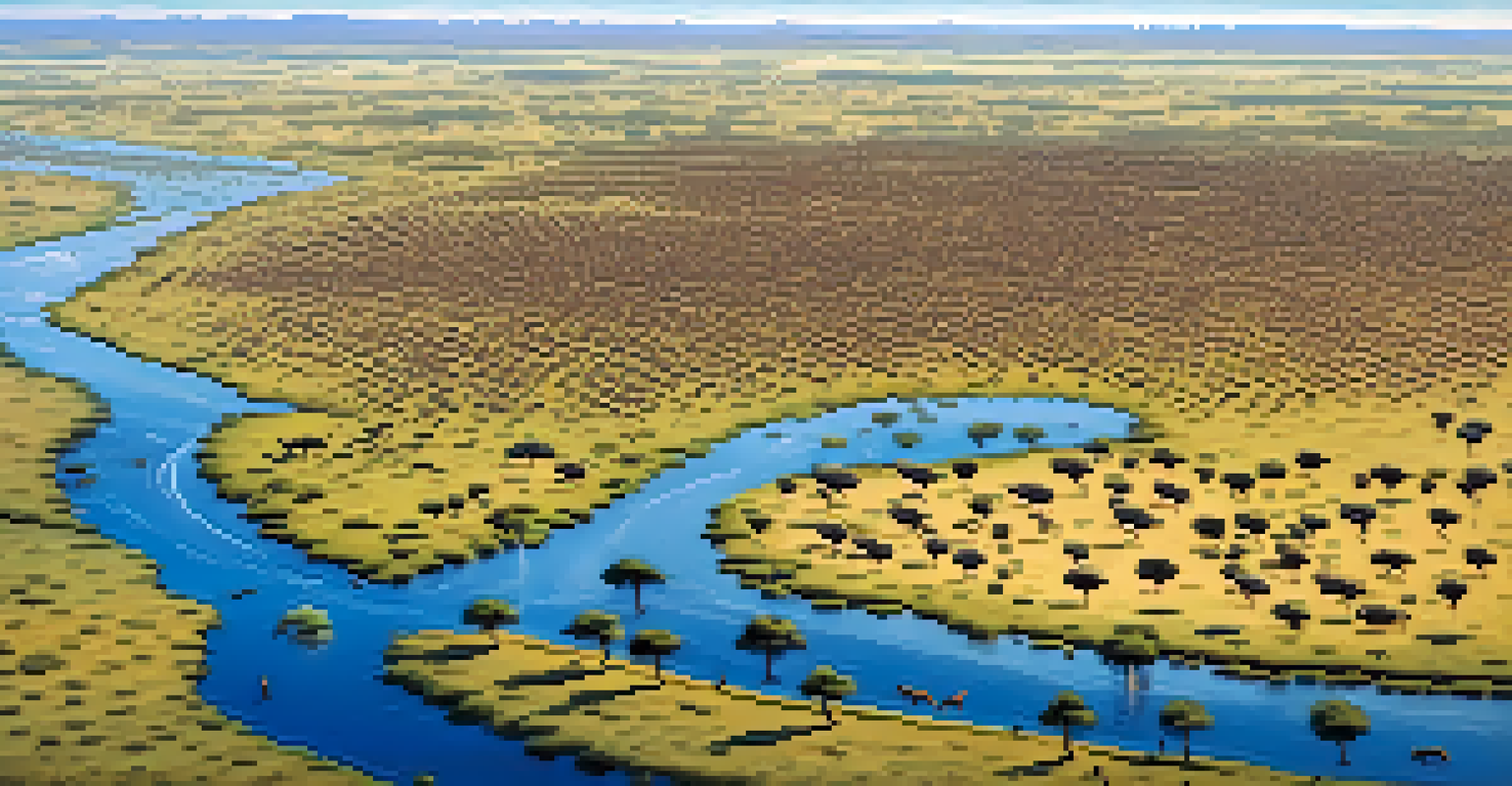Top 10 Destinations for Eco-Friendly Wildlife Safaris

1. Maasai Mara National Reserve, Kenya: A Conservation Leader
Maasai Mara is not just famous for its stunning landscapes; it's also a leader in eco-friendly safaris. The reserve implements strict measures to protect its wildlife while promoting sustainable tourism practices. Visitors can engage with local Maasai communities, learning about their traditions and conservation efforts firsthand.
The greatest threat to our planet is the belief that someone else will save it.
The reserve offers a variety of eco-lodges that minimize their environmental impact, ensuring that the safari experience is both exciting and responsible. These lodges often use solar energy and practice water conservation, allowing guests to enjoy nature without leaving a heavy footprint.
By choosing Maasai Mara, travelers support initiatives that help protect endangered species like the black rhino and cheetah. This creates a win-win situation where visitors can witness the incredible wildlife while contributing to its preservation.
2. Serengeti National Park, Tanzania: Nature's Grand Stage
The Serengeti is renowned for its spectacular migration of wildebeest, but it's also committed to eco-friendly tourism. With numerous eco-lodges and mobile camps, visitors can immerse themselves in the breathtaking landscapes without disturbing the delicate ecosystem. Each lodge is designed to blend seamlessly into the environment.

Sustainable practices in the Serengeti include waste reduction and the use of local materials in construction. Many lodges also support local communities by sourcing food and services from nearby residents, fostering a sense of shared responsibility for the land.
Eco-Friendly Safaris Protect Wildlife
Many national parks and reserves prioritize sustainable tourism practices that help conserve endangered species and their habitats.
Choosing an eco-friendly safari in the Serengeti allows travelers to witness one of nature's most remarkable events while contributing to the conservation of its wildlife and habitats.
3. Chobe National Park, Botswana: A Water Wonderland
Chobe National Park is famous for its large elephant population and stunning river landscapes. Eco-friendly safaris here often involve boat tours that minimize land impact, allowing guests to observe wildlife in a serene setting. These tours are not only breathtaking but also provide a unique perspective on the ecosystem.
In every walk with nature one receives far more than he seeks.
The park's lodges prioritize sustainability, often featuring solar power and water-saving technologies. Many operators also participate in wildlife conservation efforts, ensuring that tourism directly benefits the local fauna and flora.
By visiting Chobe, travelers can enjoy an unforgettable safari experience while supporting initiatives that protect the environment and its inhabitants.
4. Galápagos Islands, Ecuador: Nature's Laboratory
The Galápagos Islands are a unique destination for eco-conscious travelers, known for their extraordinary biodiversity. Strict visitor regulations ensure that the delicate ecosystem is preserved, making it a model for sustainable tourism. Guided tours are often led by naturalist guides who educate visitors about conservation efforts.
Eco-friendly cruises and lodges are available, allowing guests to experience the islands without harming their environment. These accommodations often incorporate local materials and practices, showcasing the beauty of sustainable living.
Local Communities Benefit from Tourism
Eco-friendly lodges and tours often source materials and services from local residents, fostering economic growth and a shared responsibility for conservation.
A safari in the Galápagos is more than just wildlife viewing; it's an opportunity to connect with nature and learn about the importance of protecting these unique ecosystems.
5. Kruger National Park, South Africa: A Wildlife Haven
Kruger National Park is one of Africa's largest game reserves and is committed to sustainable tourism practices. The park offers a variety of eco-friendly lodges and camps that focus on conservation and community engagement. Visitors can enjoy guided walks and drives that emphasize the importance of protecting wildlife and their habitats.
Many tour operators in Kruger are dedicated to educating guests about the local flora and fauna, fostering a deeper appreciation for nature. This creates a memorable safari experience that is both enjoyable and informative.
By choosing eco-friendly options in Kruger, travelers play a part in the ongoing efforts to conserve this incredible wildlife haven.
6. Borneo's Rainforests: The Last Green Frontier
Borneo is home to some of the world's oldest rainforests and is a critical habitat for endangered species like orangutans and pygmy elephants. Eco-friendly wildlife safaris here often involve guided treks through lush jungles, where visitors can witness the rich biodiversity up close. These experiences are designed to minimize the ecological impact while maximizing wildlife encounters.
Sustainable lodges in Borneo prioritize eco-friendly practices, from using renewable energy to supporting local conservation initiatives. This ensures that tourism benefits both the environment and the local communities.
Unique Experiences in Biodiverse Areas
Travelers can engage in immersive wildlife experiences in some of the world's most biodiverse regions while contributing to their preservation.
Traveling to Borneo for a wildlife safari is not just an adventure; it's a chance to contribute to the preservation of one of the planet's most vital ecosystems.
7. Yellowstone National Park, USA: A Natural Wonder
Yellowstone National Park is America's first national park and a prime example of eco-friendly tourism. The park's management emphasizes conservation and sustainability, offering a variety of eco-tours that educate visitors about its unique geothermal features and diverse wildlife. This helps foster a greater appreciation for the natural world.
Visitors can explore the park through guided hikes, wildlife watching tours, and educational programs that highlight conservation efforts. Many lodges and campsites utilize sustainable practices, ranging from waste management to energy conservation.

Choosing Yellowstone for a wildlife safari means experiencing stunning landscapes and iconic animals while supporting ongoing conservation initiatives.
8. Pantanal, Brazil: The World's Largest Wetland
The Pantanal is one of the most biodiverse regions on Earth and offers a unique safari experience. This vast wetland is home to a wide array of wildlife, including jaguars, capybaras, and hundreds of bird species. Eco-friendly tours in the Pantanal focus on responsible wildlife observation and the importance of preserving this delicate ecosystem.
Many lodges in the Pantanal emphasize sustainability, often incorporating local materials and practices into their operations. These lodges also support local communities, ensuring that tourism benefits everyone involved.
An eco-friendly safari in the Pantanal not only provides incredible wildlife encounters but also contributes to the conservation of this extraordinary ecosystem for future generations.